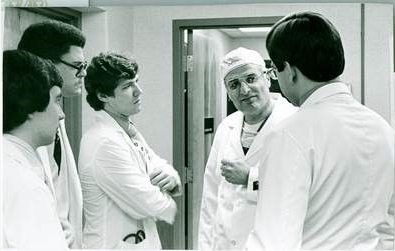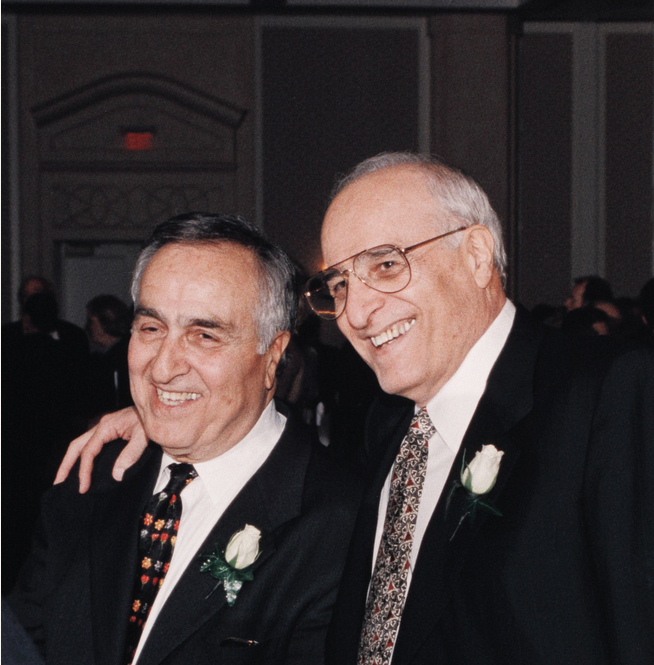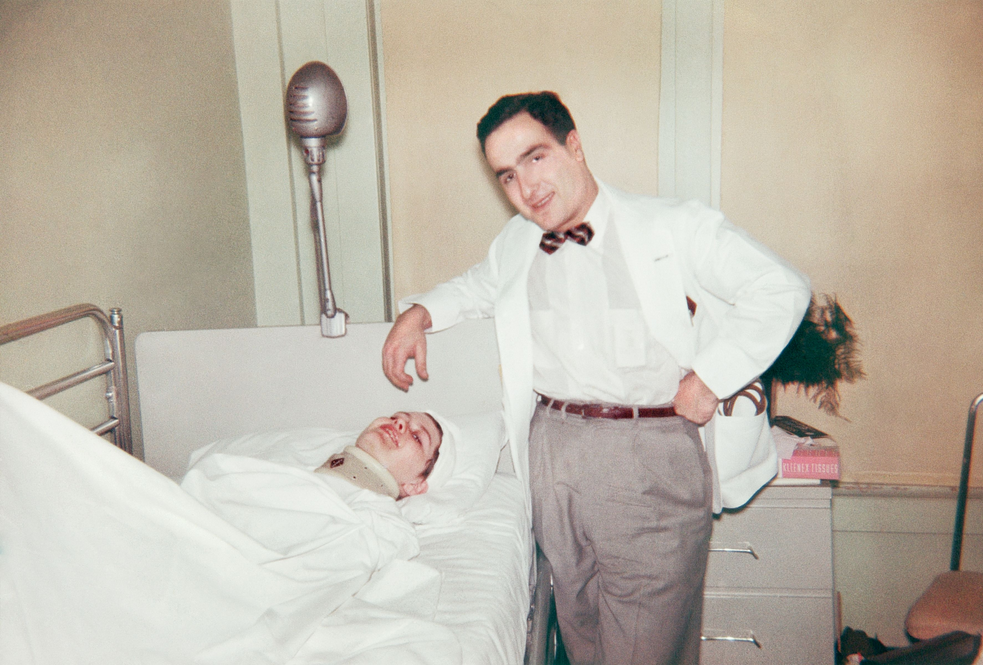Leading The Way In Surgery
Photos by AARON PATTON
For Wichita Surgical Specialists, P.A. President and CEO Alex Ammar, surgery runs in his blood.
Ammar recalls gathering for brunch with his family every Sunday growing up, where his mom would cook Mediterranean food and his whole family — sisters, cousins, uncles, including famed Wichita surgeons George and Jim Farha — would be in attendance.
“I got educated whether I knew it or not,” said Ammar, of the experience, looking back fondly at that weekly family tradition.
Ammar, a Virginia native who has been in Wichita since 1974, credits his uncles and mentors, George and Jim, in part for influencing him to become a surgeon and take up practice in Wichita.
DEVELOPING A MEDICAL HUB IN KANSAS
Wichita Surgical Specialists (WSS), founded in 1963 by Lebanese immigrants and brothers, George and Jim Farha, is celebrating 60 years in operation. When it was initially founded as the Wichita Surgical Group, the Farhas built it into one of the largest private surgical practices in the country at the time and played a major role in Wichita’s development as a medical hub in Kansas.
Fast forward to today, Wichita Surgical Specialists is the largest surgical group in the area and features 35 physicians, 12 surgical specialties, seven locations and about 110 additional staff members. Ammar has been with the group for 41 years, including the last 25 as its leader.
“We are basically the backbone of whatever happens in surgery in this community,” Ammar said.
In the six decades in Wichita, the surgical group has only had two CEOs (George Farha and Ammar) and two administrators (Joan Gerber and Kari Clark).
“That’s pretty remarkable in this day and age. I’m proud of that,” Ammar said. “It’s been a very stable group.”
INVESTING IN EDUCATION
From the beginning, George and Jim were passionate about teaching and saw it as an investment in the quality of medical education. So, when the opportunity came along in 1971, George jumped at it, being instrumental in bringing to Wichita the University of Kansas School of Medicine and its department of surgery. George was the first chair of the surgery department and taught at the school for more than three decades. In 1986, the school established the George J. Farha Library. Ammar, the second and current chair of the surgical department since 1998, indicated that many of the physicians with WSS are teachers in the surgery department today.
We are instrumental in education,” Ammar said. “Without our group, if it were to ever go away, it would be a tremendous setback for not just Wichita but the surrounding area and a lot of the state.”
In all, the surgical teams at WSS have mentored more than 3,000 medical students and trained more than 250 surgery residents.
“Our hires, surgeon-wise, are a bit more scrutinized than you typically might find,” Ammar said. “One of the reasons is we’re intimately involved in the education system of medical students and residents here. We know when we hire people, we’ve been training them for five to 10 years. It’s a totally different situation with someone you interviewed for an hour and then tried to make the best decision you could. We can get the best people.”
OFFERING QUALITY & TECHNOLOGY
WSS offers top-notch surgeons in many areas, including vascular, cardiovascular, general, colorectal, breast, trauma, weight loss, liver, burn, critical care and neurological surgery.
As for the most difficult type of surgery?
“If you have a redo operation, those are much more difficult,” Ammar said, “regardless of what surgical specialty you’re in, because of all the scar tissue.”
WSS uses the most advanced technology in medicine, including robotics and stenting procedures.
“There are all sorts of uses for robots that actually allow the surgeon to sit at a desk and manipulate the arms of a robot and can be more precise with that than they can with their hands,” Ammar said.
Other big breakthroughs from WSS include performing the first kidney, pancreas and heart transplants in Wichita and being instrumental in starting the first Level I trauma center at Ascension Via Christi St. Francis, Ammar said.
“We have brought a lot of new technology and surgery to the city,” Ammar said, citing minimally invasive treatments and laparoscopic gallbladder surgery as other examples where WSS led the way.
Ammar shared how times have changed in his own specialty of peripheral vascular surgery, where fixing an aneurysm in the abdomen used to leave patients in the hospital for a week, followed by another couple of months to recover. Today, patients go home the next day and recovery is significantly shorter, he said.
“For me personally, I would say 75 percent of my practice was different when I retired (from being a surgeon in 2018) than it was when I started,” he said. “And that’s because of technology.”
GROWING COMMITMENT
WSS has withstood the test of time thanks, in part, to its growth. In 1996, Mid-Kansas Ear, Nose & Throat Associates merged with WSS. Additionally, WSS established new subdivisions in 2000 and 2007 with Breast Care Specialists and Vein Care Specialists, respectively.
Ammar will be the first to tell you being a surgeon isn’t always easy, as it sometimes requires long, stressful and unusual hours.
“There’s so much responsibility to the patient,” Ammar said. “Sometimes the risks are such that you may not be able to do well by the patient every single time. So, in that sense, it’s a demanding specialty. Not only physically, but mentally and emotionally.”
EVALUATING PATIENT OPTIONS
A positive to being a surgeon, and one of the things that interested Ammar initially, is that the reward can often be more immediate after treating a patient as opposed to other specialties that have to follow a patient long term.
And one of the misconceptions about surgery, Ammar added, is that a lot of people think all surgeons do is operate.
“They have to make a decision whether the patient needs an operation or not,” Ammar said. “For me personally, well over half the patients I saw never had surgery because, based on my evaluation, they didn’t need it.”
PLANNING FOR THE FUTURE
When the brothers Farha retired in the 1990s, Ammar said he spoke at their retirement celebration and referred to them as “Sweetheart George” and “Tiger Jim.”
“Dr. George would give you a blank check, and Dr. Jim would demand a 50% discount. Dr. George would hire, and Dr. Jim would fire. They complemented each other very well,” Ammar said of his uncles, and both were motivated by a mutual goal of caring for their patients.
Ammar retired from doing surgery five years ago, after performing about 15,000 operations. And for the past few years, general surgeon Brent Lancaster has been shadowing Ammar with the intention of taking over the group when Ammar retires. In the meantime, Ammar is optimistic about the future for WSS.
“I think you’re always going to need surgeons. We’re still a very viable group after all these years,” Ammar said of WSS, which also includes his son Chad, a vascular surgeon. “We’re independent; we’re not owned by anybody. We’re a private practice, and we intend to stay that way.”
“We’re intimately involved in the education system of medical students and residents here. We know when we hire people, we’ve been training them for five to 10 years. It’s a totally different situation with someone you interviewed for an hour and then tried to make the best decision you could. We can get the best people.”
- Alex Ammar
P.A. President and CEO | Wichita Surgical Specialists








